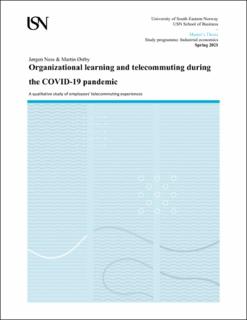| dc.description.abstract | The purpose of this master thesis is to illuminate how the learning processes regarding the working method of telecommuting has been impacted by the COVID-19 pandemic in the period between March 2020 and February 2021. This is relevant considering the drastic impact restrictions caused by the COVID-19 pandemic has had on work organization. The novelty of crisis-driven telecommuting means that existing literature about the aforesaid topics are isolated from each other and lacks intraconnection, although we expect new interest to occur. The theoretical background of the thesis consists of an overview of literature on telecommuting and organizational learning during crises. The theoretical background for organizational crisis learning shows that crises can accelerate organizational learning by breaking down existing beliefs and norms. The literature examined on telecommuting addressed struggles regarding social connectivity to work, family life and home environment, however, in general job satisfaction and productivity tends to be positively considered. We use a single case study to examine a Norwegian subsea company. The sample (N=14) consist of both regular employees and HR-personnel, which provided insights into their experiences of using telecommuting in the given period, and how it has affected them individually as well as the company as a whole. The study has been designed to target employees’ own thoughts, reflections, and experiences regarding the effects of telecommuting. The results of the study demonstrates that there has been a large impact on the learning on telecommuting, and it seems likely that this will have an impact on future work organization and working methods within the examined company. The results are presented by looking at the organizational learning related to telecommuting within the case company, similarities and contrasts between our findings and the existing literature, and how telecommuting can be implemented as a working method post-crisis. We also highlight further research opportunities to examine these same mechanisms in a more varied collection of companies and contexts, as the study is limited by the inherent disadvantages of conducting a single case study. | |
